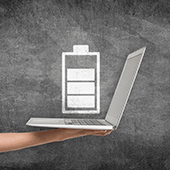
Some truths about your laptop battery
Batteries in many modern devices are lithium-based — either lithium-ion or lithium-polymer — and users must take note of the following guidelines for proper battery maintenance:
- Leaving your battery completely drained will damage it.
- Batteries have limited lifespans. So no matter what you do, yours will age from the very first time you charge it. This is because as time passes, the ions will no longer be able to flow efficiently from the anode to the cathode, thereby reducing the battery’s capacity.
What else can degrade your battery
Besides being naturally prone to deterioration, your battery can degrade due to higher-than-normal voltages, which happens when you keep your battery fully charged at all times. Even though a modern laptop battery cannot be overcharged, doing so will stress and harm your battery.
Both extremely high temperatures (above 70°F) and low temperatures (32–41°F) can also reduce battery capacity and damage its components. The same goes for storing a battery for long periods of time, which can lead to the state of extreme discharge. Another factor is physical damage. Remember that batteries are made up of sensitive materials, and sustaining a shock from a fall or similar can damage them.
How to prolong your battery life
Now that you know some facts about your laptop battery, it’s time to learn how to delay its demise:
- Never leave your battery completely drained.
- Don’t expose your battery to extremely high or low temperatures.
- If possible, charge your battery at a lower voltage.
- If you need to use your laptop for a long period of time while plugged into a power source, it’s better to remove the battery. This is because a plugged-in laptop generates more heat that will damage your battery.
- When you need to store your battery for a few weeks, you should recharge your battery to 40% and remove it from your laptop for storage.
These are just a few tips on extending the life of your hardware. There are many more ways you can maximize your hardware efficiency and extend its longevity. Call our experts today to find out more!

You must be logged in to post a comment.